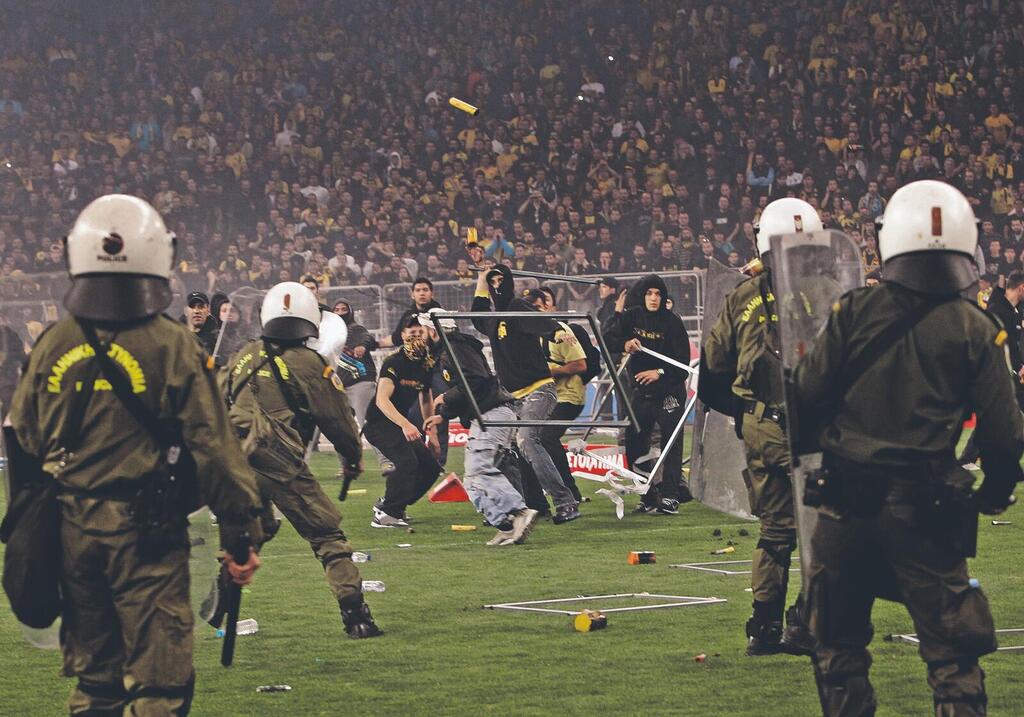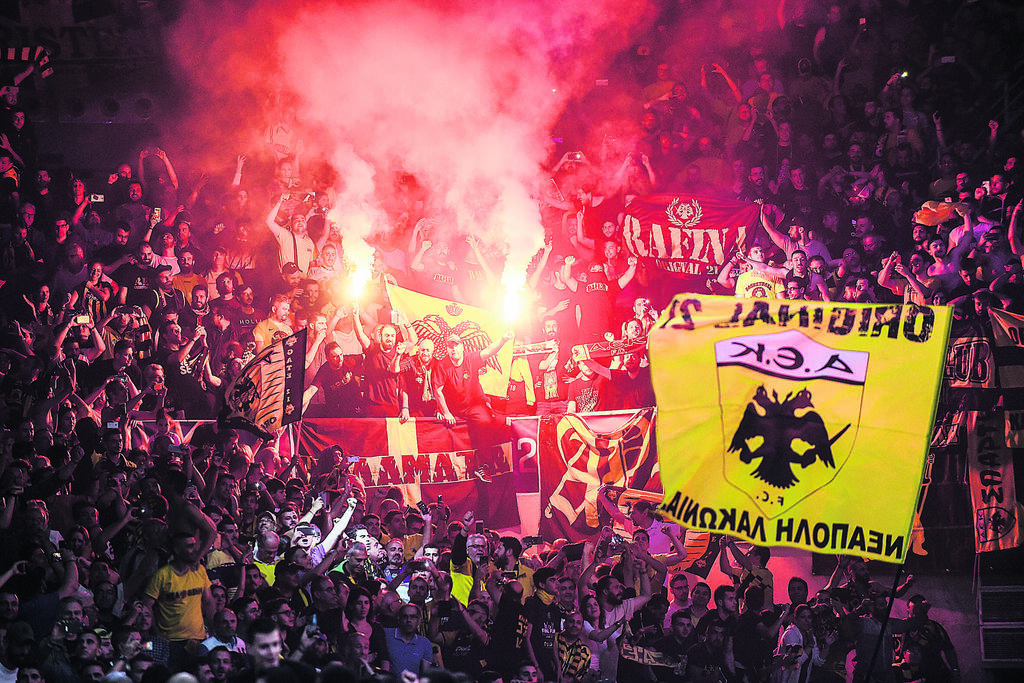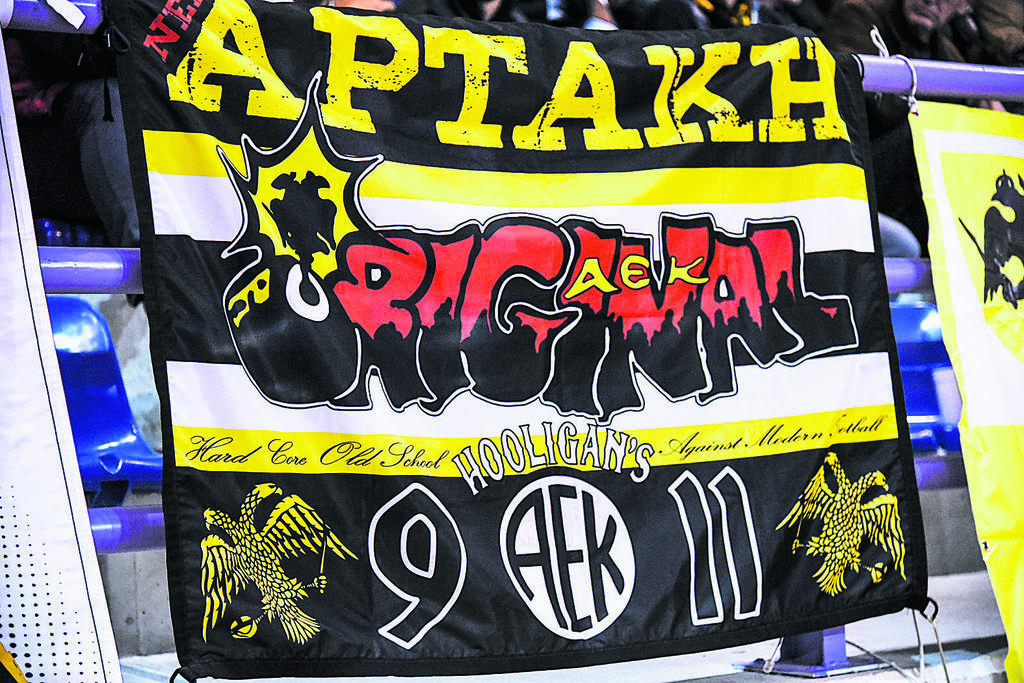Getting your Trinity Audio player ready...
The insidious nature of violence is akin to that of an addiction; as you indulge in it, your level of tolerance gradually increases, until it fails to elicit the same shock and repulsion that it once did.
Consider, for instance, the sight of fervent fans mercilessly assaulting their opponents with iron rods - an act that would have once been deemed barbaric and abhorrent. Yet, in a world where violence is increasingly prevalent, it is but a mere drop in the ocean of depravity.
AEK fans throwing fireworks
(Footage: Hapoel Jerusalem)
The ghastly spectacle of individuals casually snuffing out each other's lives with their bare hands is a jarring testament to our society's insatiable hunger for more, more, more.
Through conversations held this week with both the CEO of AEK Athens and journalists who cover them, a disconcerting impression emerged in the wake of the recent violent episode that transpired during the Hapoel Jerusalem team's visit to the Greek capital.
Despite Hapoel officials being visibly shaken by the events, AEK representatives seemed to take a nonchalant attitude toward the matter. According to them, the outburst of violence, although regrettable, was a mere blip on the radar. Why not instead focus on the uneventful second half of the game?
This response, callous and indifferent, speaks volumes about the desensitized mentality that permeates modern society, wherein even the most egregious of transgressions can be brushed aside with alarming ease.
From the Greek perspective, the Israeli response to the recent altercation appeared to be somewhat exaggerated.
As Christos Tsaltas, a seasoned journalist who has been closely following the AEK club since 2016, recounts, a prior encounter against Rejo Emilia in December was marked by truly abhorrent acts of violence, with the players physically assaulting each other in a bone-chilling face-to-face confrontation.
The incident left onlookers genuinely frightened. In the aftermath, AEK was meted out a harsh punishment, including a fine of ten thousand euros and a ban on audience participation for three games.
The scourge of violence has long been an undercurrent within Greek basketball, with AEK Athens being a particularly notable offender.
The club's ultra group, "Original 21", has been known to perpetrate some of the most heinous acts of violence, including a shocking display during a Champions League football match in 2018. What began with Molotov cocktails being hurled ended with the visiting Ajax fans drenched in blood.
Emboldened by their impunity, the group then turned their attention to basketball, bringing their brand of hooliganism to the sport. Journalists covering the group have aptly referred to them as "Hooligans," although many choose to remain anonymous for fear of reprisal.
Hapoel CEO, Yuval Levisman, recounts the harrowing experience of travelling to Israel for a game with a notoriously hostile crowd. The sense of trepidation was palpable from the moment they landed, with Levisman describing the feeling as akin to carrying a coffin.
With advance knowledge of the impending danger, they meticulously planned their approach, treating it like a military operation. A security detail was arranged, and they arrived several days prior to the game, leaving no stone unturned in their preparations.
All fans were urged to only travel on the buses provided, and they were advised against wearing club shirts in public. It was essentially a travel warning. To ensure that the location of the meeting place was not compromised, the arrangements were made in WhatsApp groups on Tuesday evening, just prior to the game.
"As I sat in the stands with my wife and three children, watching the game unfold, we initially took the lead," he recounts. "But our momentary elation was soon drowned out by the deafening sound of explosives and fireworks being hurled in our direction.
"The acoustics of the arena made it sound as if we were under siege by a suicide attack. Chaos ensued, and we found ourselves busy trying to calm down those around us.
"But things were about to take a turn for the worse. Suddenly, we realized that the opposing team's fans had breached the security and made their way inside the hall. What followed was utter mayhem, with the vandals completely destroying the toilets and arming themselves with stones.
"After the violent disruption, dozens suffered panic attacks while others hid in the bathroom. Children clung to their parents in terror. People were in battle shock.
"Outside, fans were clashing with police, leading to a terrifying scene. Continuing the game was the only option, as any other decision would have resulted in a massacre or pogrom. It was a terrorist incident."
According to Georg Hynas, the CEO of AEK, has a different take on the proceedings. He claims that the problem began when Jerusalem arrived at the hall later than scheduled. As a result, he says, they had to speed up the entry of fans to avoid any potential violence between Israelis and Greeks outside the arena.
"I must note that due to the delay, we couldn't properly check the entrances, he says. "However, it's important to acknowledge that there was no physical violence between fans.
"At halftime, the police representative assured us that those responsible for the disturbance had been removed from the arena, allowing the game to continue normally without any further incidents. It's worth mentioning that this small group of fans doesn't represent the majority of our audience.
"The group responsible for the violence were anarchists who came to cause chaos and burn the Israeli flag. They acted independently and have no affiliation with our club, and our true supporters have denounced their actions.
"Our club issued an apology to the Israeli fans and reiterated that we hold no anti-Semitic or anti-Israeli beliefs. It's unjust to label us based on the actions of a small group.
"As a club with over a million fans worldwide, we recognize the shared history between our peoples and the tragedies of genocide that we have both experienced."
"As a journalist, I can confirm that incidents like this have also occurred against Italian teams. Unfortunately, every stadium has a group of hooligans, usually between the ages of 18-25, who enter for free and are influenced by the ultras.
"These hooligans are often easily manipulated and follow orders blindly. The problem is that no one takes responsibility for controlling them. It is a common issue in Greek sports, and despite statements from the government and team presidents, nothing seems to change.
"Tragically, last February, a young Aris fan named Alkis Campanos was murdered in Thessaloniki after being asked about his team affiliation."







